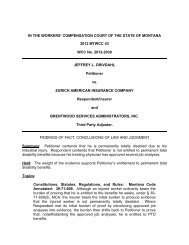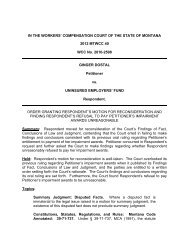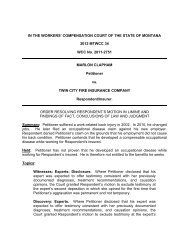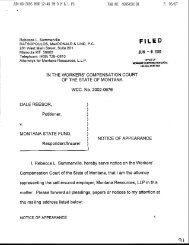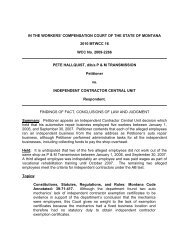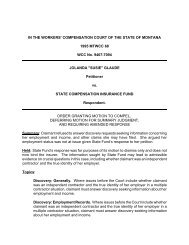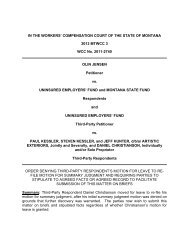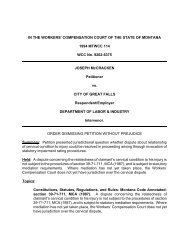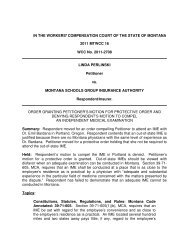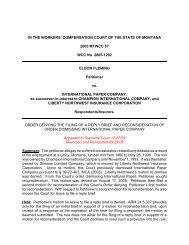Order To Show Cause Why Sanctions Should Not Be Imposed
Order To Show Cause Why Sanctions Should Not Be Imposed
Order To Show Cause Why Sanctions Should Not Be Imposed
You also want an ePaper? Increase the reach of your titles
YUMPU automatically turns print PDFs into web optimized ePapers that Google loves.
IN THE WORKERS’ COMPENSATION COURT OF THE STATE OF MONTANA<br />
1994 MTWCC 112<br />
WCC No. 9411-7173<br />
BETH RYKOWSKY<br />
Petitioner<br />
vs.<br />
STATE COMPENSATION INSURANCE FUND<br />
Respondent.<br />
ORDER DENYING MOTION TO DISMISS;<br />
ORDER TO SHOW CAUSE WHY SANCTIONS SHOULD NOT BE IMPOSED<br />
Summary: In order to meet deadline for next Missoula trial term, counsel for claimant filed<br />
a petition alleging that mediation requirements had been satisfied. In fact, while mediation<br />
had been held, and counsel asserted that both parties knew the case would not settle<br />
through mediation, the mediator had not yet issued the mediation report.<br />
Held: Under section 39-71-2411, MCA (1993), the Workers’ Compensation Court does not<br />
have jurisdiction until a mediator has issued the mediation report and at least one party<br />
does not accept the mediator’s recommendation. Counsel’s statement in the petition that<br />
mediation requirements were satisfied was at best misleading, leading the Court to require<br />
counsel to show cause why sanctions should not be imposed upon him. While the Court<br />
understands counsel’s desire for speedy resolution of his client’s claim, the Workers’<br />
Compensation Court rules and procedures allow application for emergency trial if a true<br />
exigency exists. The Court also typically cooperates with special settings. Those<br />
procedures should have been followed.<br />
<strong>To</strong>pics:<br />
Constitutions, Statutes, Regulations, and Rules: Montana Code Annotated:<br />
section 39-71-2411(6), MCA (1993). Under section 39-71-2411, MCA (1993), the<br />
Workers’ Compensation Court does not have jurisdiction until a mediator has issued<br />
the mediation report and at least one party does not accept the mediator’s<br />
recommendation. Counsel’s statement in the petition that mediation requirements
were satisfied was at best misleading where in fact no mediation report had issued,<br />
leading to the Court’s order to show cause why sanctions should not be imposed<br />
upon him. While the Court understands counsel’s desire for speedy resolution of<br />
his client’s claim, the Workers’ Compensation Court rules and procedures allow<br />
application for emergency trial if a true exigency exists. The Court also typically<br />
cooperates with special settings. Those procedures should have been followed.<br />
Mediation. Under section 39-71-2411, MCA (1993), the Workers’ Compensation<br />
Court does not have jurisdiction until a mediator has issued the mediation report and<br />
at least one party does not accept the mediator’s recommendation. Counsel’s<br />
statement in the petition that mediation requirements were satisfied was at best<br />
misleading where in fact no mediation report had issued, leading to the Court’s order<br />
to show cause why sanctions should not be imposed upon him. While the Court<br />
understands counsel’s desire for speedy resolution of his client’s claim, the Workers’<br />
Compensation Court rules and procedures allow application for emergency trial if<br />
a true exigency exists. The Court also typically cooperates with special settings.<br />
Those procedures should have been followed.<br />
Jurisdiction: Mediation. Under section 39-71-2411, MCA (1993), the Workers’<br />
Compensation Court does not have jurisdiction until a mediator has issued the<br />
mediation report and at least one party does not accept the mediator’s recommendation.<br />
Counsel’s statement in the petition that mediation requirements were<br />
satisfied was at best misleading where in fact no mediation report had issued,<br />
leading to the Court’s order to show cause why sanctions should not be imposed<br />
upon him. While the Court understands counsel’s desire for speedy resolution of<br />
his client’s claim, the Workers’ Compensation Court rules and procedures allow<br />
application for emergency trial if a true exigency exists. The Court also typically<br />
cooperates with special settings. Those procedures should have been followed.<br />
The respondent has moved to dismiss the petition on account of petitioner's failure<br />
to complete mediation prior to the filing of the petition on November 7, 1994. The motion<br />
has been briefed by both parties and is deemed submitted.<br />
The petition in this case was filed on the last day permitted for it to be placed on the<br />
trial calendar for the next term of Court in Missoula. That term is the week of January 18,<br />
1995.<br />
Petitioner argues that it was necessary to file the petition on November 7, 1994, to<br />
ensure a trial during the next Missoula term. She acknowledges that the mediation<br />
requirements had not been technically satisfied on the date of filing but argues that they<br />
were completed in spirit. Petitioner's counsel informs the Court that a mediation<br />
conference was held on October 31, 1994, and that at that time "both counsel knew the<br />
<strong>Order</strong> Denying Motion <strong>To</strong> Dismiss:<br />
<strong>Order</strong> <strong>To</strong> <strong>Show</strong> <strong>Cause</strong> <strong>Why</strong> <strong>Sanctions</strong> <strong>Should</strong> <strong>Not</strong> <strong>Be</strong> <strong>Imposed</strong> - Page 2
case was not going to be resolved in the mediation process." (Response to Motion to<br />
Dismiss at 2.) Petitioner's attorney requested the mediator to issue an expedited<br />
recommendation so the filing deadline could be met. When the recommendation was not<br />
forthcoming, he filed the petition anyway.<br />
In prior orders this Court has held that the mediation statutes require the mediation<br />
requirements to be fully satisfied before the filing of any petition. The Court previously<br />
dismissed a petition filed by petitioner's present attorney because it was filed before the<br />
mediator had made a written recommendation. Cindy L. Hill v. State Compensation<br />
Insurance Fund, WCC No. 9407-7086 (July 26, 1994 <strong>Order</strong> Dismissing Without Prejudice).<br />
In its <strong>Order</strong> the Court specifically directed petitioner's attorney to section 39-71-2411(6),<br />
MCA, which provides:<br />
(6) A party shall notify the mediator within 45 days of the<br />
mailing of his report whether the party accepts the mediator's<br />
recommendation. If either party does not accept the mediator's<br />
recommendation, the party may petition the workers' compensation<br />
court for resolution of the dispute. [Emphasis and italics<br />
added.]<br />
In his brief, petitioner's counsel does not argue that the mediation requirements had been<br />
met at the time the petition was filed, only that "mediation was substantially complete by<br />
10/31/94 and totally complete prior to the filing of the motion to dismiss." (Response to<br />
Motion to Dismiss at 5; italics added.)<br />
The rules of this Court require that petitions for accidents occurring after July 1,<br />
1987, contain "a statement that the mediation provisions set forth in section 39-71-2411,<br />
MCA, have been complied with." ARM 24.5.301(1)(e). The petition in this case contains<br />
the following statement:<br />
5. The mediation provisions of §39-71-2401 et seq MCA<br />
have been complied with in that a mediation session<br />
has been held and no agreement has been reached; .<br />
. .<br />
(Petition at 2.)<br />
At best this statement is patently misleading.<br />
The petition is signed by petitioner's attorney, Howard <strong>To</strong>ole. Section 39-71-<br />
2914(3), MCA, provides that an attorney's signature on any pleading is his certification that<br />
he has read the pleading and that "to the best of his knowledge, information, and belief<br />
formed after reasonable inquiry, it is well grounded in fact; [and that] it is [also] warranted<br />
by existing law or by a good faith argument for the extension, modification, or reversal of<br />
<strong>Order</strong> Denying Motion <strong>To</strong> Dismiss:<br />
<strong>Order</strong> <strong>To</strong> <strong>Show</strong> <strong>Cause</strong> <strong>Why</strong> <strong>Sanctions</strong> <strong>Should</strong> <strong>Not</strong> <strong>Be</strong> <strong>Imposed</strong> - Page 3
existing law." At the time the petition was filed, the mediation requirements of section 39-<br />
71-2411, MCA, had not been fulfilled. Petitioner's counsel knew or should have known that<br />
the requirements had not been met.<br />
Section 39-71-2914(4), MCA, provides:<br />
(4) If a petition, pleading, motion, or other paper is<br />
signed in violation of this section, the court, upon motion or<br />
upon its own initiative, shall impose an appropriate sanction<br />
upon the person who signed it, a represented party, or both.<br />
The sanction may include an order to pay to the other party or<br />
parties the amount of the reasonable expense incurred<br />
because of the filing of the petition, pleading, motion, or other<br />
paper, including reasonable attorney fees.<br />
The circumstance of this matter leads me to conclude that it is appropriate to order<br />
petitioner's counsel to show cause why sanctions should not be imposed pursuant to this<br />
provision.<br />
The Court recognizes the need for speedy resolution of workers' compensation<br />
disputes. On the other hand, the parties and their attorneys cannot ignore the plain terms<br />
of the mediation statutes even though completing mediation, as in this case, means missing<br />
the filing deadline for the next term of court. If the filing deadline were to take precedence<br />
over the legislative mandate for mediation, then the mandate would be ignored by all.<br />
This does not leave a party without procedural recourse where the exigencies of the<br />
case require an early hearing. Court rules specifically provide for expedited trials in<br />
emergency situations. ARM 24.5.311. Claimants who miss a filing deadline may invoke<br />
the rule if the situation is truly an emergency. The Court is also willing to work with parties<br />
to set hearings for times other than the regularly scheduled trial terms, and is willing to try<br />
cases in Helena virtually anytime it is not travelling. Counsel are admonished that those<br />
avenues should be pursued rather than disregarding the mediation requirements.<br />
There remains the matter of disposing of the motion to dismiss. Since mediation has<br />
now been completed, dismissal would only result in the immediate filing of a new petition,<br />
the opening of a new Court file, and the generation of more paperwork, all of this<br />
unnecessary. A better alternative exists, and that is to vacate the present trial setting and<br />
put the case on the next Missoula trial term scheduled for the week of April 24, 1995. This<br />
achieves the same result as dismissal.<br />
<strong>Order</strong> Denying Motion <strong>To</strong> Dismiss:<br />
<strong>Order</strong> <strong>To</strong> <strong>Show</strong> <strong>Cause</strong> <strong>Why</strong> <strong>Sanctions</strong> <strong>Should</strong> <strong>Not</strong> <strong>Be</strong> <strong>Imposed</strong> - Page 4
THEREFORE, IT IS HEREBY ORDERED that the motion to dismiss is denied but<br />
the trial setting for the week of January 23, 1995, is vacated. A new scheduling order will<br />
be issued setting the case for the April 24, 1995, Missoula term of court.<br />
IT IS FURTHER ORDERED that petitioner's counsel, Howard <strong>To</strong>ole, shall appear<br />
before the Court in Helena at 1:00 p.m., December 28, 1994, to show cause why the Court<br />
should not impose sanctions pursuant to section 39-71-2914(4), MCA..<br />
Dated in Helena, Montana, this 9th day of December, 1994.<br />
(SEAL)<br />
/s/ Mike McCarter<br />
JUDGE<br />
c: Mr. Howard <strong>To</strong>ole<br />
Mr. Daniel J. <strong>Why</strong>te<br />
<strong>Order</strong> Denying Motion <strong>To</strong> Dismiss:<br />
<strong>Order</strong> <strong>To</strong> <strong>Show</strong> <strong>Cause</strong> <strong>Why</strong> <strong>Sanctions</strong> <strong>Should</strong> <strong>Not</strong> <strong>Be</strong> <strong>Imposed</strong> - Page 5


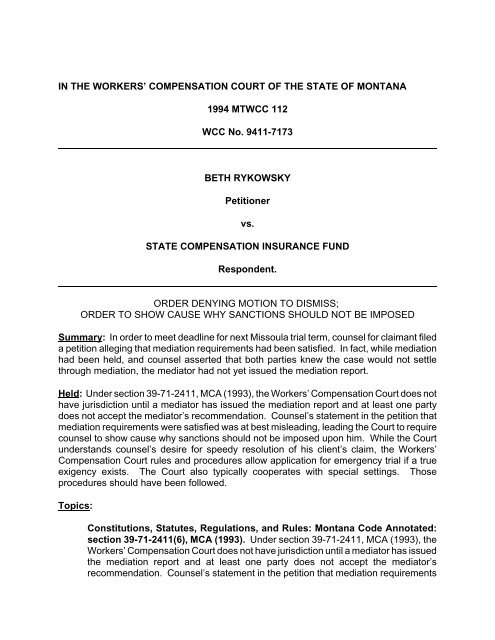
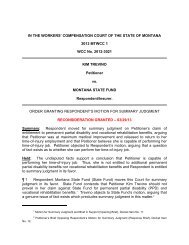
![Bustell v. AIG Claims Service, Inc. [05/03/05] 2005 MTWCC 23](https://img.yumpu.com/49777654/1/190x245/bustell-v-aig-claims-service-inc-05-03-05-2005-mtwcc-23.jpg?quality=85)
![Vallance v. MCCF [07/05/06] 2006 MTWCC 26 - Workers ...](https://img.yumpu.com/48724322/1/190x245/vallance-v-mccf-07-05-06-2006-mtwcc-26-workers-.jpg?quality=85)
